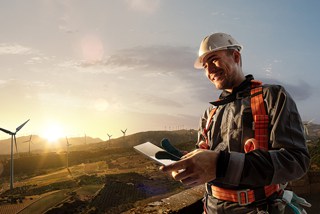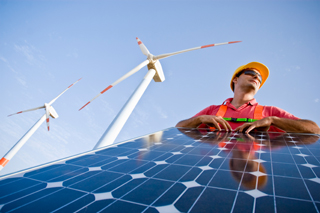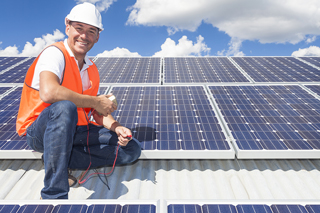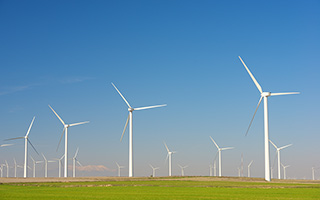22 Environmental Sustainability Jobs That Truly Matter
Our collective future depends on environmental sustainability jobs becoming commonplace. Thankfully, they continue to multiply as more people around the world begin to recognize the vital importance of reducing humanity's negative impacts on the climate and global ecosystems. People with green jobs are contributing to the potential for a better existence for all of us—a future in which we might avoid the catastrophic effects of global warming, pollution, and resource depletion.
According to a Pew Research survey, more than 70 percent of American adults believe that the nation should do whatever is required to protect our environment. But we can't just rely on our government and political leaders to take action. Each one of us needs to make sustainability our own way of life.
It means finding ways to live and work in harmony with our natural world by following practices that reduce our dependency on essential resources. And it means ensuring that we don't compromise the ability of future generations to have a good quality of life.
Sustainability professionals and other people with environmental jobs get to help our towns, cities, organizations, industries, and institutions reduce their ecological footprints. They help us minimize and take care of our waste responsibly. They find or promote ways to decrease our pollution of the atmosphere. They help ensure that our watersheds aren't contaminated or depleted. And they help us plan for potential disasters, including those that are rare or unpredictable.
In short, people with careers in sustainability are at the leading edge of a green revolution that absolutely must happen. And right now is a great time to become one of them.
Examples of Sustainability Careers That Merit Consideration
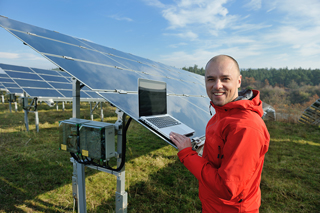 It isn't always so obvious why sustainability is important. After all, the positive impacts of sustainable practices sometimes only reveal themselves after significant time has passed. But that shouldn't stop you from building a career that makes a real contribution toward a better future for ourselves, subsequent generations, and all of the other life that shares this planet with us.
It isn't always so obvious why sustainability is important. After all, the positive impacts of sustainable practices sometimes only reveal themselves after significant time has passed. But that shouldn't stop you from building a career that makes a real contribution toward a better future for ourselves, subsequent generations, and all of the other life that shares this planet with us.
You have the chance to make a big difference. Just remember that getting a job in sustainability might require persistence and a little creative thinking. Although a lot of well-defined career paths exist for people who want green jobs, some opportunities are a little more hidden.
In a lot of cases, sustainability professionals create their own opportunities within occupations that aren't necessarily associated with environmental responsibility. They are able to present the business case for sustainable practices and expand their roles accordingly. So you might have an opportunity to make a difference even if you don't work in a field that's directly related to sustainability.
Still, direct examples of sustainability jobs are numerous. For instance, the world's renewable energy sector, by itself, supports jobs for at least 11 million people, according to the latest figures from the International Renewable Energy Agency. Those people work in areas like solar energy, wind power, biofuels, hydropower, biomass energy, and geothermal technology. And their numbers are likely to keep increasing since it is vital that we stop using fossil fuels.
Plus, many other kinds of professionals get to work directly on environmental and sustainability issues within the companies, non-profit organizations, government agencies, and research institutions that employ them. They've often received at least some of their training from environmental technology schools.
Here are 22 sustainability occupations that merit a closer look:
1. Electrical Engineering Technician
As power utilities transition to the use of more clean energy technologies, many technical professionals are getting the chance to contribute toward the green revolution. A lot of electrical engineering technicians now get to help design, install, test, and maintain renewable energy equipment for utilities and green manufacturers.
2. Wind Turbine Technician
Want a hands-on role in the renewable energy industry? Wind energy technicians get to install, maintain, and repair giant turbines that generate clean electricity from the natural movement of air.
3. Solar Photovoltaic Technician
This is the fastest-growing occupation in America. Between 2020 and 2030, the number of jobs in this trade is expected to increase by 52 percent. No other occupation is at that level of growth. You could be prepared to work with solar panels and equipment that generate and store clean power from the sun's rays by getting solar energy training.
4. Sustainability Manager
With a background in business management and plenty of knowledge about sustainable practices, you can help organizations reduce their negative impacts on the environment. Sustainability managers often get to advise top executives, lead and oversee green initiatives, and identify areas for ongoing improvement (such as water conservation, energy efficiency, waste disposal, and the reduction of carbon emissions).
5. Sustainability Specialist or Coordinator
In these roles, professionals often carry out or coordinate the general plans of sustainability managers. But in many cases, they get to design green campaigns and propose and manage plans of their own as they relate to reducing an organization's consumption of energy and resources or securing funding for various sustainability projects.
6. Sustainability Consultant
Organizations that don't have their own in-house sustainability professionals often hire outside consultants to help them become more environmentally responsible. So, as a sustainability consultant, you could help many different companies and other organizations identify ways to come into alignment with ecological limits and make environmental considerations central to their decision-making processes.
7. Green HVAC/R Technician
Ever heard of solar or geothermal heating and cooling? Today, several clean technologies exist that are much more energy-efficient and environmentally friendly than traditional methods of generating warm or cool indoor climates. As an HVAC technician, you could specialize in installing, maintaining, and repairing those kinds of green climate-control systems. Read more about HVAC trade school training.
8. Sustainability Engineer
People in this profession often develop and lead strategies for the design and implementation of sustainable processes and environmental-compliance programs. In some cases, they also support initiatives aimed at reducing carbon emissions or conserving resources by coordinating with government agencies or nearby organizations.
9. Environmental Analyst
In this occupation, you could investigate the impacts of human activity on various ecological systems and help devise plans of action that reduce harm to our soil, air, and food and water resources. A background in sciences such as hydrology, biology, and geology are often necessary for succeeding in this field.
10. Sustainable Architect
The buildings that we live and work in are often major contributors to resource consumption and greenhouse-gas emissions. That's why the work of green architects is so valuable. They know how to design residential, commercial, and industrial buildings that are energy-efficient and that cause little harm to the environment during their construction or over the lifetimes of their use.
11. Environmental Engineer
This type of engineering is all about coming up with solutions to problems that are related to air pollution, water contamination, waste disposal, soil degradation, and other environmental issues. For example, some environmental engineers have devised solutions like closed-loop sewage systems, methane-capture systems in landfills, and improved recycling methods.
12. Environmental Engineering Technician
Professionals in this role are typically involved in carrying out the plans that have been developed by environmental engineers. As part of their work, many of them collect environmental samples in order to test pollution levels. And some of them operate special equipment for cleaning up polluted settings or preventing pollution from occurring in the first place.
13. Conservation Scientist
As someone who specializes in environmental science, you could play an important role in preserving, protecting, restoring, and managing natural resources. Your studies and observations could help companies or communities maintain adequate supplies of water, minerals, trees, and other resources for both current and future needs.
14. Green Construction Manager
 Knowing how to construct buildings with sustainable materials—and in a way that minimizes harm to the environment—is becoming an increasingly vital skill set. By specializing in this area of construction management, you could make a bigger difference than you might realize.
Knowing how to construct buildings with sustainable materials—and in a way that minimizes harm to the environment—is becoming an increasingly vital skill set. By specializing in this area of construction management, you could make a bigger difference than you might realize.
15. Sustainability-Conscious Financial Advisor
Environmentally responsible investing enables people to put their money where their hearts are. But it can be challenging to navigate the financial world without the help of a knowledgeable advisor, especially when it comes to sustainable investment options. That's why financial advisors who specialize in green investments are often in high demand.
16. Sustainable Interior Designer
Being able to design, decorate, and furnish interior spaces with environmentally friendly products and materials is a good way to complement the work of sustainable architects. Plus, it means that you get to feel good about the minimal impact that your career has on the natural world.
17. Green Landscape Designer
Water conservation is a major issue in most regions, and it's growing more and more important every year. But many properties have landscapes that require huge quantities of water, which makes them unsustainable. So green landscape designers are needed to show communities and property owners that it's possible to have beautiful landscaping without water-hogging grass lawns or overly thirsty plants. In fact, xeriscaping (i.e., drought-tolerant landscaping) is becoming increasingly popular in a lot of regions.
18. Sustainable Industrial Designer
The world's landfills are full of used and discarded products that will never decompose. Many of them even contaminate the soil and groundwater by leaking toxic elements or chemicals. Plus, they are often made from a variety of natural resources that can't be regenerated. That's why the work of industrial designers is so vital. Those who specialize in sustainable design are able to develop products that are manufactured responsibly and made from materials that decompose, can be recycled or—even better—can be perpetually reused without any degradation in quality.
19. Atmospheric Scientist
As human-caused global warming continues to accelerate, climate and meteorological scientists are needed more than ever to help study the problem and predict its impacts. Extreme weather represents only one of many aspects that need to be studied on an ongoing basis.
20. Environmental Lawyer
It's an unfortunate reality: Some corporations and governments choose to ignore environmental regulations or try to hide the harm that their decisions have caused to people, animals, and the natural world. As a result, lawyers who specialize in ecological issues can assist in holding companies and leaders accountable for their irresponsible and damaging actions.
21. Environmental Economist
Is it possible to create a thriving economy built on sustainable development and respect for the environment? That's the question that many economists grapple with. And the answer that many of them have arrived at is yes. Focusing on long-term sustainability can actually have positive benefits to the economy, even in the short term. Environmental economists specialize in creating more holistic economic models that take the health of our natural world into account.
22. Green Entrepreneur
Do you enjoy the excitement of taking risks and advocating for new and better solutions? By starting your own green business, you can help create a more sustainable world by selling services or products—such as locally grown organic food, as just one example—that solve environmental problems or that don't cause harm to the ecological systems we depend on. Salaries for green entrepreneurs vary greatly, but it's possible to make a terrific living.
Why Is Sustainability Important?
 Think of it this way: Humans have the choice of becoming a sustainable species or an extinct one. That might sound overly dramatic, but the possibility of extinction is very real. History is littered with civilizations that have collapsed because of their unsustainable practices. The difference now is that we are a global civilization. We might all collapse together.
Think of it this way: Humans have the choice of becoming a sustainable species or an extinct one. That might sound overly dramatic, but the possibility of extinction is very real. History is littered with civilizations that have collapsed because of their unsustainable practices. The difference now is that we are a global civilization. We might all collapse together.
According to the Global Footprint Network, it already takes the Earth over a year and a half to regenerate what humanity uses in just one year. That means we are using the equivalent of 1.75 planets in order to support our collective lifestyle. By 2030, based only on moderate scenarios, we might require the equivalent of two planets in order to continue supporting our current practices.
Clearly, that high rate of resource consumption and waste cannot continue. We only have one planet. The math is not in our favor. Our global civilization is unsustainable because it can't be maintained indefinitely without destroying ourselves and much of the rest of the planet along the way, including many other species.
Some people believe that we can keep inventing new technologies that will get us out of trouble and delay or prevent catastrophe. But we can't be sure of that. And a lot of our new inventions create new problems, many of which we never see coming.
For example, several modern technologies that we now rely on—including many so-called green technologies—are only made possible because of rare earth elements. But those represent a very limited resource. And they are often mined in environmentally destructive ways.
America—and the rest of the world—needs to adopt a stronger focus on sustainability while we still have time to avoid the worst-case scenarios. Almost every day, new facts emerge that point to our current unsustainable reality. For example:
- According to estimates from the United Nations, the world's population is expected to grow from just under 8 billion people in 2022 to almost 11 billion people by 2100.
- As much as 40 percent of all food in America gets wasted after being produced.
- The World Health Organization says that each year, roughly 13.7 million people around the world die because they live or work in unhealthy environments. Plus, environmental problems—like climate change, chemical exposure, ultraviolet radiation, and water, air, and soil pollution—are contributing factors in over 100 types of injuries and diseases.
- NASA data reveals that globally, the sea level has been rising at almost twice the rate that it did during the last century. And the acidity of the ocean's surface waters has risen by roughly 30 percent since the start of the Industrial Revolution.
- According to NASA, the amount of spring snow cover in the Earth's northern hemisphere—a major source of fresh water—has been decreasing for more than five decades. And the snow that does exist is melting earlier and earlier. Plus, Arctic sea ice continues to decline, glaciers keep retreating worldwide, and the ice sheets of Greenland and Antarctica continue to shrink rapidly.
The result of our currently unsustainable civilization is this: Within his or her lifetime, the average person is now over five times more likely to die in an extinction event (such as climate change) than in a car accident. Plus, even if we don't kill off our own species, our unsustainability will likely create or intensify problems such as:
- Food shortages
- Disease epidemics and pandemics
- Water shortages
- Mass die offs of ocean life
- The extinction of other species
- Larger, more frequent forest fires
- Resource wars and other conflicts
- Extreme weather events
- Massive floods—both coastal and inland
- Mass migrations of refugees
- Economic collapse
- Violence and social unrest
- Worsening quality of life for everyone, especially the poor
The environment is intimately linked with everything that we so often take for granted. So, without enough people working toward true sustainability, the outlook is bleak. Our survival depends on lowering our consumption of natural resources and radically decreasing our pollution of the planet.
That's why job seekers who pursue careers in sustainability should be considered heroes. They deserve our support and gratitude because they often do some of the most essential work of the modern era. Will you become one of them?
Be Part of the Solution
Turn your career ambitions into powerful agents of positive change. Find training for environmental sustainability jobs right now by entering your zip code into the convenient search tool below!

